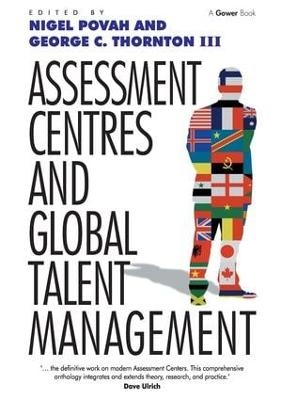
Assessment Centres and Global Talent Management
Routledge (Verlag)
978-1-4094-0386-9 (ISBN)
Globalization, innovation, market share, identifying visionary leaders and, particularly, talent management ...are just some of the issues that benefit from using assessment and development centres. Assessment Centres and Global Talent Management focuses on topics that influence the design of the assessment centre in terms of the competencies being assessed, the exercises that are used and the nature of the event, so that they can deliver what is required; often to change organizational culture and values. Practical examples and case studies are sprinkled throughout the book as international contributors explore cross-cultural implications, and consider how the design, development and use of assessment centres should be adapted to different cultures. Some of the world's leading researchers and practitioners outline their research into new applications for assessment centre methods, showing how they have used it to design and implement specific assessment and development centres. This is a book from which practitioners can see how science informs good practice, and scholars will find the 32 chapters a rich source of ideas for conducting research into emerging issues in the field.
Nigel Povah is the CEO and founder of Assessment & Development Consultants Ltd (A&DC), one of the UK's leading firms of Occupational Psychologists. He has a degree in Psychology from Leeds University and an MSc in Occupational Psychology from Birkbeck College. He is a Chartered Occupational Psychologist, an Associate Fellow of the British Psychological Society and a Founder Member of the Association of Business Psychologists. Nigel has over 30 years experience in assessment and development centres and is the co-author of a book of the same name (Gower, 2004). He was a member of the BPS committee which created the guidelines for best practice in the design and implementation of assessment and development centres and he frequently presents papers at conferences. Over the years Nigel has worked with private and public sector clients, such as Compaq, DTI, DVLA, Ford, HMRC, Ordnance Survey, Parker Hannifin and Unilever. He is a former professional Chess player and has represented England and he holds the title of International Master. Dr George Thornton earned his Ph.D. in Industrial Psychology from Purdue University. He has over 40 years experience in the design, implementation, evaluation, and litigation of assessment centres, and is a recognized authority on the assessment centre method for selection, promotion, diagnosis, and development. He has consulted with private and public organizations and given workshops worldwide. An author of four books on assessment centre methods, George is Co-Chair of a task force that wrote Guidelines and Ethical Considerations for Assessment Center Operations, and winner of Outstanding Professional Contributions Award from the Society for Industrial and Organizational Psychology.
Part I: AC Best Practice; Chapter 1: Three Themes that Explain Our Passion for Assessment Centres as Tools for Talent Management; Chapter 2: We're Doing Better than You Might Think: A Large-Scale Demonstration of Assessment Centre Convergent and Discriminant Validity; Chapter 3: An Alternative Take on AC Research and Practice: Task-Based Assessment Centers 1; Chapter 4: Adjusting Exercise Design in Assessment Centers: Theory, Practice, and Research; Chapter 5: Fit For Purpose? Considerations when using ‘Off-the-shelf' versus ‘Customized' Simulation Exercises; Chapter 6: Using Computer-Based Simulation Technology within an ADC: A South African Case Study; Chapter 7: Integrating Candidate Data: Consensus or Arithmetic?; Chapter 8: The Impact of ACs and DCs on Candidates; Chapter 9: Whiter than White? The Diversity Credentials of Assessment and Development Centres; Chapter 10: The Assessment of Managers: A Review and Integration of Assessment Center and Multisource Performance Rating Research and Practice; Chapter 11: Fifty Years On: The Ongoing Reciprocal Impact of Science and Practice on the Assessment Center Method; Part II: Corporate Strategy and Talent Management; Chapter 12: Building a Talent for Talent; Chapter 13: The Challenges Associated with a Large AC inGovernment: A South African Case Study; Chapter 14: Using Assessment Centres to Facilitate Collaborative, Quasi-Standardized, Industry-Wide Selection: Lessons Learned from Medical Specialty Placement in England and Wales; Chapter 15: Certifying Competencies of HR Managers with the Assessment Centre Method: Quality Assurance that HR Contributes to Corporate Objectives; Chapter 16: Pioneering Assessment Centers within Local Government in Sweden: Gothenburg's Search for Better Leaders; Chapter 17: In Pursuit of a Diversification Strategy: Using an Assessment Centre to Identify Global Talent; Chapter 18: Integrating a Developmental Assessment Centre with other Human Resource Interventions; Chapter 19: The Evolution of an Assessment Center Program in a Pharmaceutical Sales Organization over a 15-Year Period; Chapter 20: Influencing Decisions About Assessment and Development Centres for Talent Management; Chapter 21: Failure and Success Factors in Assessment Centers: Attaining Sustainability; Part III: International Issues and Implications; Chapter 22: A Review of Recent International Surveys into Assessment Centre Practices; Chapter 23: Assessment Center Practices in South Africa, Western Europe, and North America; Chapter 24: Assessment Center Adaptation and Implementation in Indonesia; Chapter 25: Variations in Assessment Centers in South Korea's Public Service; Chapter 26: The Contribution of Assessment Centres to the Selection and Development of Future Leaders in the Singapore Public Service; Chapter 27: Eating the Elephant: Tackling the Challenges of Introducing Assessment and Development Centres in East Africa; Chapter 28: The Application of the Assessment Center Method in China; Chapter 29: The Use of Assessment and Development Centres in Russia; Chapter 30: Assessment Center Practices in Japan: A Brief History and Challenges 1; Chapter 31: Assessment Centers in Israel: Some Practices and Perspectives; Chapter 32: Assessment Centers in Organizational and Cultural Contexts: Evidence of the Versatility of a Proven Human Resource Intervention
| Erscheint lt. Verlag | 28.11.2011 |
|---|---|
| Verlagsort | London |
| Sprache | englisch |
| Maße | 174 x 246 mm |
| Gewicht | 1292 g |
| Themenwelt | Wirtschaft ► Betriebswirtschaft / Management ► Personalwesen |
| ISBN-10 | 1-4094-0386-6 / 1409403866 |
| ISBN-13 | 978-1-4094-0386-9 / 9781409403869 |
| Zustand | Neuware |
| Haben Sie eine Frage zum Produkt? |
aus dem Bereich


